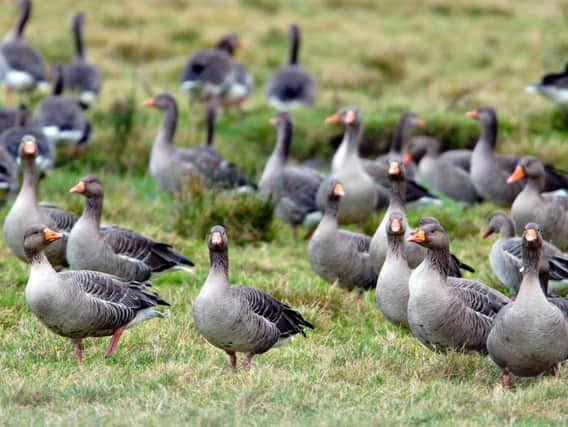Orkney greylag goose pushed as Scotland's next big dish as shooting intensifies on islands


Greylags can now be shot under special licence during July and August as part of a pilot to bring down the resident population with their meat now sold legally across Scotland for the first time.
There are hopes to create a new market for Orkney greylag goose meat in Scottish restaurants and butchers with the European Commission now giving farmers a three-month extension to the trading window, which will now close in January 2020.
Advertisement
Hide AdAdvertisement
Hide AdRecipes promoting the use of the Orkney bird, including wild greylag goose breasts in marmalade glaze, Orkney wild goose stew and Orkney goose paella have been drawn up to help support the scheme. Goose sausages and burgers are also made on the islands.
Claudia Rowse, SNH’s Head of Natural Resource Management said: "We are delighted to announce the continued sale of resident greylag goose meat.
"Now, licensed sellers from Orkney will have a chance to develop the market for their product and people can try goose for themselves, on Orkney, and across Scotland.
“Wild geese are an important part of Scotland’s nature, but their rapid rise in numbers has been challenging for farmers and crofters. We know that striking the balance between conservation, farming and hunting can be difficult.
“Our goal is to give farmers and crofters the tools they need to safeguard their crops, allowing them to control goose numbers sustainably and sell goose meat for profit.”
Farmers said the extension will encourage greater numbers of geese to be shot in the summer months given the potential financial returns.
Around 30,000 greylags live on Orkney all year round with farmers reporting costly damage to their spring and summer crops as the geese graze in the fields during the day.
A further 40,000 migratory greylags stop in Orkney on their winter travels.
Advertisement
Hide AdAdvertisement
Hide AdFigures on the number of birds shot under the new licences have yet to be finalised although one farmer suggested that between 1,500 to 2,000 greylags have been killed.
However, it is believed the pilot has only capped numbers and not significantly reduced the population.
SNH is now consulting on the use on stronger methods to bring the population under control, from creating a stronger sports hunting industry on Orkney to oiling eggs in springtime so the young can't hatch to bringing in marksmen.
It is understood that the corralling of geese may be piloted next year, when the birds are rounded up during moulting season when they can't fly and 'humanely dispatched' by lethal injection. Around 250-300 birds could be killed each time this way.
Farmer Alan Corrigall said he lost around two to three acres of young barley a year which costs around £1,000 to plant, with claims some farmers have stopped growing the crop altogether.
He said the summer shooting licences had not been particularly effective.
He said: "It is very difficult to shoot a goose in these months as there is so much day light. You can't get close to them and you are in a ditch waiting for first light when they come off the water. First light in July is around 2.30am in the morning.
"It is a help that the licence is being extended to allow the goose to be traded across Scotland and help create this sustainable system whereby the farmer will get a wee bit more for the goose and perhaps more people will be willing to shoot them in July and August."
Advertisement
Hide AdAdvertisement
Hide AdMr Corrigall said young goose meat was 'nice' and that he could see it taking off in top end restaurants that specialised in game.
Two butchers on Orkney are licensed to prepare and distribute the meat with hotels, shops and restaurants on Orkney making use of the product so far, it is understood.
Sale of wild goose meat shot outside the project is prohibited under the Wildlife and Countryside Act 1981.